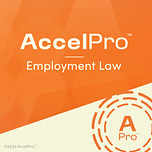AccelPro is built for motivated professionals and innovative companies. Sign up now, and your annual membership will include a free trial and a discount of more than 40%.
Welcome to AccelPro Employment Law, where we provide expert interviews and coaching to accelerate your professional development. Today we are featuring a discussion with Kate Nearpass about how to keep workplace investigations neutral.
Nearpass, a veteran investigator who recently co-founded her own firm, says neutrality is crucial to building trust into the system and can help avoid further escalation of claims, including litigation.
“Employers who want to have a process like this, who have gone through the not-insignificant hurdle of putting together an office or a team of people who will take these complaints in, really do want to see the workplace improved,” she says.
“They want their workplaces to be safe and fair. And they want their employees to trust the process. If there is any actual conduct on the part of the investigators that suggests that they are always going to come out in favor of the employer, for example, nobody’s going to trust the process.”
Today’s sample is below. To listen to or read the full AccelPro Employment Law interview, join our paid membership program.
Most AccelPro members expense their memberships or take a tax deduction. Please let us know if your employer has any questions about our community.
Basic Membership: One full interview each month, along with samples of the weekly podcast and occasional events.
Monthly or Annual Membership:
The weekly podcast, available in the player of your choice
Transcripts and supplemental materials for each interview
Private group events inspired by industry trends and your requests
Curated collections from the archive, including Worker Classification and Discrimination
CLE credit based on the interviews is coming soon
If you sign up now, your annual membership will include a free trial and a discount of more than 40%.
Interview References:
Kate Nearpass’s Nearpass and Koegel profile.
8:45 | Harvard Implicit Association Test. Project Implicit. Harvard University.
TRANSCRIPT
Matt Crossman, Host: Today we’re going to talk about tips to keep workplace investigations neutral. You started your own firm last year. Before that, you worked in private practice and for universities. What kind of investigations have you typically been part of in those jobs?
Kate Nearpass: In my higher ed role, where I was for 13 years before I started the firm last year, my investigations were limited to allegations of discrimination and harassment based on protected classes. That included investigations into sexual misconduct, sexual assault and dating domestic violence, those types of allegations. And there were plenty of those types of complaints to investigate in the higher ed context. I think by the time I left that job, we saw over 600 complaints in the prior year.
Since I’ve left though, I’ve expanded my scope a little bit. I’m not limited to discrimination, harassment and sexual misconduct, although I still do quite a bit of each. It’s really any bad behavior people engage in at work.
MC: I want to start out with a question about why this is important. We live in an era of hot takes. It’s never too soon to jump to conclusions. In some areas of life, neutrality is seen as archaic or even as a negative. When it comes to workplace investigations, why is neutrality important?
KN: There’s two things to think about here. One is why it’s important that your investigation be actually neutral and actually free of bias. And then the second thing to think about is why you want to make sure your investigation is free of the perception of bias.
And so when you talk about making sure your investigation is actually free of bias, actually neutral, I think it’s largely because employers who want to have a process like this, who have gone through the not insignificant hurdle of putting together an office or a team of people who will take these complaints in and look at them, really do want to see the workplace improved.
They want their workplaces to be safe and fair. And they want their employees to trust the process. If there is any actual conduct on the part of the investigators that suggests that they are always going to come out in favor of the employer, for example, nobody’s going to trust the process. Nobody’s going to go through the process. And why have we invested all of this time and effort in putting this process together?
The other thing to think about though, is why it’s really important to make sure that even if there’s no bias in your process, that there is no room for anyone to claim there’s a perception of bias.
I see this all the time. It’s a natural end game for these processes that somebody is going to be unhappy. It’s not adversarial in the sense that it’s not litigation, but still you have usually two people, sometimes more, who are asking for two different things to come out of this process and they’re not both going to get it. Somebody is going to come out of this and be unhappy.
And the first recourse of the person who is unhappy with the results of the investigation is to claim bias on the part of the process or the investigator. It happens all the time. And you need to make sure that there’s absolutely nothing for them to cling to when they make that allegation.
If there is, nobody’s going to trust the process. Most employers are actually good humans, and they want to improve their workplace. But there’s also a bottom-line implication to this, right? If you have a process that people trust, they feel heard, they trust the outcome, they are less likely to seek external validation. They’re less likely to go to some agency like the EEOC, for example, or to file a lawsuit.
MC: Now, on to the three tips. Number one, you say investigators should treat each party exactly the same. What does this look like in an actual investigation?
KN: I think this is important because it’s something that’s so easy to do, and so easy to forget to do, because I’m really just talking about the logistics of the investigation.
If one party asks for a little bit more time to provide evidence—they need another week to collect text messages, for example—then the other party gets another week, too. I even go so far as using the exact same language in emails I send to both parties. I send them at the exact same time. I get all my emails drafted, and then I click send at the same time. That way there’s no question about who had information first.
It’s really logistical and nuts and bolts, but it’s easy to forget to do that because I think there is a sense, particularly with investigations that concern allegations of sexual trauma, that the complainant is owed more of a duty of care than the respondent because of the type of complaint that the person is bringing forward.
And that’s not to say that care should not be provided to somebody who, for example, is making a complaint of sexual assault. Absolutely, employers often have resources to provide to those folks, like EAP, for example. If you’re in the higher ed context, it’s maybe a counseling center, those sorts of things. And they should be provided, but not by the investigator, because the investigator cannot be a victim’s advocate.
You’ll notice I use the word complainant rather than victim. I use respondent rather than a word like perpetrator because victim and perpetrator are loaded language, and they suggest you’ve already drawn a conclusion about what may or may not have happened.
MC: That’s tip number one—investigators should treat each party exactly the same. Tip number two is investigators have a duty to educate themselves continually—and you emphasize that word continually—on the impact their implicit biases have on investigations and a duty to continually check those biases during investigations.
Two key words there, educate and check. What do you mean by check?
KN: Check your biases can mean two things. First, let’s check to see where you stand in terms of your unconscious biases. And the most useful tool that I have seen out there is Harvard has a website called Project Implicit, and it’s a really fabulous resource. There are tests that you can take for free on all sorts of stereotypical biases that a person might have on different national origins, race, weight, religion.
It tests based on your reaction time, what your bias might look like. It gives you a rating, and it is absolutely humbling. I’ve done a few of these. I like to think that I’m somebody who’s very well aware and very well educated about this. And my results were not what I had hoped they would be.
Like I said, it’s humbling. But it’s also a great reminder that this is the thing that absolutely everybody needs to work on. And it doesn’t really matter how much reading you do on it, how comfortable you are talking about this with colleagues and peers.
Everybody has these biases. I think it’s important not to moralize that. A lot of people get very defensive about the idea or the suggestion that they have unconscious biases, and that’s not helpful at all.
If you get defensive and insist that they don’t exist, you’re not doing any work to counter them. If you understand that everybody has them, then you’re more open to being aware of them and looking at them in the course of an investigation.
We often think about unconscious or implicit biases in terms of protected classes—race, religion, national origin, age, that sort of thing. And that’s absolutely true, and something we need to be thinking about. But people also have their own very personal unconscious biases based on their own experiences. You might have some unconscious reaction if you’re interviewing a witness who tells you they are a regular churchgoer, depending on your thoughts on organized religion and your life experience related to religion.
It’s not useful if I don’t think about that. But it’s helpful if I can say, All right, I have to put my own opinions about this aside and listen to what this person is saying.
MC: What are some practical ways to check your bias during an investigation?
KN: One really useful technique that I end up using a lot is to try to flip the script. I’ll give you an example.
Listen to this episode with a 7-day free trial
Subscribe to AccelPro | Employment & Labor Law to listen to this post and get 7 days of free access to the full post archives.











